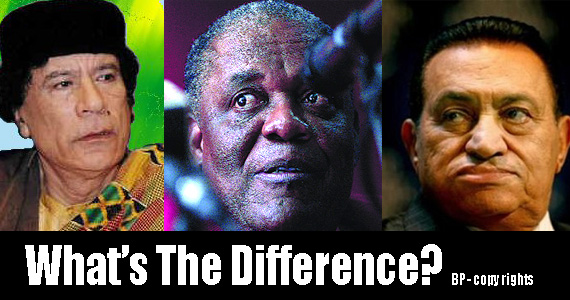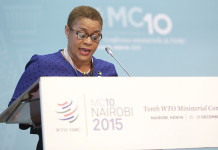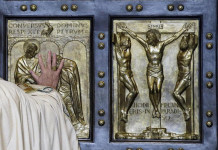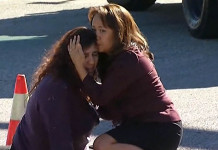Following the recent popular uprising that swept across and continues to rage in many Arab/Middle East and North African countries, oppressive and age-long dictatorial regimes have crumbled and collapsed and many other repressive and absolutist regimes in the region are teetering precariously and precipitously on the brink or labyrinth of imminent collapse. The existing political status quo that hitherto held sway in many of these countries in the region can no longer hold and has been rocked and challenged to their foundations. The “revolution” this time around seems to be quite contagious if not infectious as reverberations from affected countries are sent to the entire political landscape of the region.
One does not really know where all these will ultimately end or inexorably lead to in relation to the socio-economic and political dynamics of this vital but perplexingly volatile region. The most astonishing if not bewildering of them all seems to be the situation in Libya, a country in Maghreb North Africa whose quixotic and effervescent leader, Colonel Muammar al-Qhadaffi has ruled the oil rich country since September 1969 following the overthrow of King Idris 11 of Libya. The present “revolution” in Libya has since assumed a more dangerous dimension than was seen in the sister states of Tunisia and Egypt and has now to all intents and purposes slithered and degenerated into an all out civil war at worst or an armed rebellion at least, although the dominant western media continue to spuriously and tendentiously talk of “peaceful protest” and “peoples demonstration” for their own sinister and selfish interest or agenda. As it stands now, there are highfalutin diplomatic posturing and pontificating by some Western countries in their message and sanctimonious serminsation about military intervention and imposition of “no fly zone” on Libya which we saw in Iraq during the inglorious era of Saddam Hussein and his protracted conflict with the West.
This article examines and discusses the current internal conflict in Libya, the call for military intervention by US and the UK and France, the legality and propriety of the use of force and likely solution to bring the unfortunate political imbroglio to an end in the interest of the Libyan people and peace in the North African and Middle East region. It is this writer’s opinion that the position of the UK, France and the West which seeks to intervene militarily in Libya cannot be justified by reference to international law and legitimacy and that the hypocrisy, double standard, casuistry and selective application of the use of might by these powers does not and will not advance the cause of peace in this vital but perennially volatile region. The writer concludes by suggestion to the effect that there is an urgent imperative for the world body to genuinely seek a speedy and effective negotiated settlement or resolution of this internecine conflict in the interest of the Libyan people, the Arab world and the Middle East region. He is of the opinion that any move or step by the so called international community must command legality and propriety in international law and authentic global politics.
Libya, a very rich oil producing nation exploded in political upheaval few weeks ago following the popular uprising in two North African countries that forced out the Tunisian President Zine el Abidine Ben Ali and Egyptian President Hosni Mubarak out of power after ruling and “misgoverning” their respective countries for well over 26 and 29 years respectively. The conflict or more veritably described, the insurrection in Libya was a bit perplexing to this writer because despite all said and done, Libya under the effant terrible Colonel Al Qhadaffi, unlike Egypt and Tunisia where many years of mis-governance, deep rooted corruption, iron-clad oppression and brutal suppression of the people had impoverished a large number of the people, has fairly fared well and done well compared to those other oil rich and non oil rich Arab and Middle East/North African countries. The arrogant and unorthodox Libyan leader, Colonel Qhadaffi has fairly done well for his Libyan people and did in fact use his country’s oil wealth to advance and improve the material living condition of his people. Those who have visited Libya confirmed to this writer that despite his lunatic characteristic pathological obsession with anti-imperialism and anti-America and his special predilection for fomenting conflicts in his sister African countries, Col Qhadaffi at least in the African standard has done well for his Libyan people.
For instance, Col Qhadaffi built one of the biggest man made irrigation system in the world which cost about $40 billion dollars to irrigate his arid, desert country and to provide water for his own people. It is an indisputable fact and axiom that Libyan people do not suffer the level of enervating poverty, basic deprivation and sub human living condition commonly found in the sub Saharan African countries that are equally blessed with oil and gas and other natural resources like Nigeria, Angola, Gabon, Cameroun, Sudan, Equatorial Guinea where human beings and livestock like donkeys and cattle comfortably share the same pond and stream of water for livelihood and sustenance. It is also axiomatic and not in dispute that the leaders and governments in these sub Saharan African countries have heartlessly and callously, massively and riotously looted and squandered their oil and gas and other natural resources’ wealth/money without anything to show for it.
Thus, against the backdrop of the foregoing, it was a bit surprising when the country of Libya drifted into bloody political insurrection unprecedented in the modern history of that country and on a scale exceeding the “the popular protests and demonstrations” we witness in Egypt, Tunisia and in the other countries in the Middle East region in recent time. The root cause of the conflict in Libya largely borders more on repression and lack of universally recognised democratic and fundamental civil rights consistent with innate human aspiration and yearning to be free and the fact that the Libyan leader has long since overstayed and perpetuated himself in power/office than on economic impoverishment and deprivations of Libyan people as in Egypt and Tunisia and Yemen.
People ordinarily want a change and greeter freedom in Libya. In this regard, it should be appreciated that the “Libyan revolution” or “popular uprising” was not actuated by socio-economic suffering and impoverishment of the Libyan people as such but was borne more out of a genuine and authentic popular aspiration for a change and fundamental freedoms. The maverick and populist enfant terrible Qadaffi has been in power for over 42 years and has in the last few years turned the governance of Libya into a family affairs ruling a modern country like Libya with his family and as a private business entity just like the monarchy of King Idris 11 which he overthrow and supplanted in September 1969 did.
Despite the fact that he fairly did well for his people compared to other African and Middle East leaders/countries, Col Qhadaffi used his oil money to cause, foment and instigate conflict all over the world and earned for himself the sobriquet of an avid sponsor of international terrorism. Colonel Qhadaffi was enfant terrible and a maverick epitomised. Col Qhadaffi virtually has hands in almost all the modern conflicts in Africa and Middle East and even beyond. For instance, he was known to have supported the Polisario Front (the Peoples front for the Liberation of Saguia el Hamra[red canal] and Rio de Oro [gold river] in their struggle for liberation and independence of Western Sahara, the present-day Saharawi Arab Democratic Republic against Morocco. Al Qhadaffi supported the then former Chadian Predient Goukoni Ouadeyyi in Northern Chad against ex President Hisseine Habre and later fought Chad over the phosphate rich Aouzou strip in the Northern part of Chad which he was claiming as part of the Libyan territory until he later abandoned Libyan claim over Aouzou strip. Al Qadaffi supported the late brutal Ugandan dictator, ex President di Amin in his war against those who had risen against him until late ex President Julius Nyerere of Tanzania (of the blessed memory) drove away the blood thirsty dictator. Qhadaffi was involved in Charles Taylor’s war against Samuel Doe in Liberia. Qhadaffi also supported the Irish Republican Army (IRA) then fighting the British government in Northern Ireland. During the conflict in Lebanon, he played an active rule supporting one of the factions led by Sunni Moussa, the Sunni Moussa Bigade and when he, Al Qhadaffi sopposedly clashed with the leader of this group and it was alleged that Al Qhadaffi arranged for him to be kidnapped and brought to Libya and till today nobody knows the whereabouts of Sunni Moussa. He was also alleged to have supported the Abu Sayyaf movement in Indonesia led by Abdul Razak Janjalani and Abu Sabawa. Qadaffi massively supported the Farabundo Marti National Liberation Front {FMLN) in El Salvador led by Hafik Handal during the civil war in the Central American country. He virtually clashed with almost every African country/leader and owing to his unbridled penchant for pugnacity and bellicosity, he has few friends in entire world arena and can hardly go anywhere except perhaps North Korea, Zimbabwe or Venezuela, Burma or Laos.
Looking at the present conflict besetting Libya, one finds it very difficult to fathom with sufficient clarirty why the Western media continue to refer the conflict as “protest by the Libyan people” against Qhadaffi when to all intents and purposes, what is happening in Libya now is nothing short of a full-scale armed insurrection or uprising against the Libyan government of Colonel Qhadaffi. In fact no honest and reasonable man with a modicum or an elementary understanding of international politics will refer to what is happening in Libya as a protest or popular demonstration. Again, one may ask the appositely question whether the Western media are tendentiously and spuriously referring this armed conflict/insurrection and civil war in Libya as a “protest” or “popular uprising” or “popular demonstration” against Col Qhadaffi regime to create a ripe and fertile atmosphere for “justifiable” invasion and intervention? Is this part of the sinister, casuistic and specious and mendacious campaign of the Western Media which thrives on misinformation and sophistic propaganda to condition and shape the minds of the ignorant and the uninformed and the not well informed in their countries and in the so called third world countries? If what is happening in Libya today is not a civil war or armed rebellion or an insurrection, then this writer is truly in need of knowing from any well informed person or persons the exact nature of what is happening in Libya and what armed rebellion is and what is war in the above regard.
It should also be appreciated that this conflict or “protest” or “popular uprising” or “popular demonstration” has factually split the country into two with those loyal to the Libyan government still in control of the capital city, Tripoli and those opposing the government of Libya in control of the Eastern city of Benghazi. This has further polarised and compounded issues in Libya. Both sides have avid and fanatical supporters and engage in violence or the use of violence in the prosecution and pursuit of their clearly defined divergent political objectives. This axiomatic fait accompli ought to be objectively and dispassionately addressed. Libya like most Arab and Middle East countries is inherently and potentially a highly fractious society. The possibility of a Lebanonisation is ominously high here in the horizon.
The present-day Libya is made up of three autonomous entities or provinces that had previously had separate political existence way back in their historical experience and had struggled for political and religious supremacy in the Maghreb North Africa. The present-day Libya is made up of three traditional parts that have been in rivalry until recent times. The three traditional parts of the country are Tripolitania in the North West of Libya, Cyrenaica or Cyrene in the Eastern coast region which was part of the Creta et Cyrenaica province of Roman period and Fezzan in the south west region of modern Libya. Cyrenaica is the centre of the Libyan anti-Qhadaffi forces of the present insurrection or revolution or popular uprising with the National Transitional Council based in the city of Benghazi, the most prominent and second city of Libya. The potential for secession is also high among some Libyans in this part of the country who feel that the present socio-economic and political dynamics of modern Libya has favoured Tripolitania Libya. Those loyal to the government in Tripoli are fighting to maintain the status quo and those opposing Colonel Qhadaffi’s government are waging a violent campaign to overthrow the status quo and possibly usher in a new government.
It is also an indisputable fact that the instrumentality of the state coercive apparatus is still in the hands of the defacto and de jure Libyan government of Colonel Al Qhadaffi although those opposing this government are themselves armed and are also using the instrumentality of violent force to prosecute and pursue their political objective of bringing down the government of Libya under the effant terrible and maverick leader, Col Qhadaffi.
The conflict and crisis in Libya has assumed a more dangerous dimension and has created international humanitarian crisis of epic proportions as thousands of migrant workers from different countries seek to flee the conflagration combusting the once economically vibrant nation where they were sojourning and eking out a living. In this regard, any move by the international community, the UN, the AU, the Arab League to ameliorate the plight and suffering of thousands of these migrant workers will be a welcome development. Both parties to the conflict will bear full responsibility for anything that happens to these migrant workers. We are disheartened by the news reaching us that some unfortunate poor people from sub Saharan Africa have borne the brunt of this conflict especially at the hands of those opposing the Libyan government by being manhandled and killed in some case by the opponents of the Libyan government who see any African (note that fair/light skinned Libyan do not in fact consider themselves as Africans albeit being on the African continent) as a mercenary imported by Col Qhadaffi to fight for him as according to them, “the Libyan military refused to fight against their own people”. Nothing could be further from the truth! Those being presented as mercenaries are poor African migrant workers mainly from sub Saharan Africa who went to Libya to eke out a living owing to the unfortunate economic circumstances in their country. Today many of these migrant workers from sub Saharan Africa are being branded as “Qhadaffi’s mercenaries” and the Western media are yet to report their unfortunate plight in Libya. Why was it that other people of different nationalities in Libya were not branded as mercenaries fighting for Qhadaffi and his beleaguered government?
As previously mentioned, the current conflict in Libya has also some historical and ethnic undertones. There have been some ethnic rivalry and pent-up bottled up feeling of grievances among some Libyans. There has been underlying and deep-seated animosity and seething anger and pent up dissension among some Libyan people. However, Col Qhadaffi has been able to use pan Arab nationalism and his own version of populist socialist ideology and demagoguery and pseudo revolutionary ideology of Jammahiriyya and green revolution that emphasises on Arab unity to hold the disparate three previously autonomous entities together although he has no doubt favoured his own tribe more in the political equation in Libya in the distribution of perquisites of power in Libya.
However, this trend is not uncommon or peculiar in the greater Arab/Middle East world where leaders will emerge from a minority group in the country and consolidate their power base and grip by spuriously sermonising and pontificating about greater Arab unity and misusing the cause of Islam and the cause of pan Arabism for their own selfish interest to perpetuate themselves in power. We do recall that ex President Saddam Hussein was from Tikrit and ex Syrian President Hafez al Assad was from the small Alawite minority community in Syria and both men were able with masterly dexterity to cobble highly fractious and disparate society together using pan Arab nationalism and a form of populist socialism – in their control of their various Hez Bul Baath or Al Baath Parties in Syria and Iraq to effectively hold sharply and acrimoniously divisive country together. The only danger in this form of political control is that whenever the leader is removed or gone from power, there is always a recrudescence of those age-long tribal/ethnic and religious rivalries leading to inevitable instability in those societies. We also saw this phenomenon in the former Yugoslavia after the demise of Marshall Tito, and in Iraq after the fall of Saddam Hussein and this is waiting to happen to Syria if and whenever the Al Assad family loses power in Syria. The objective panacea against this kind of ethno-religious recrudescence of acrimonious and bitter rivalry in modern times is for any government to create and forge and nature a true sense of unity and a sense of belonging in their countries among their people. Syria can embark on this now to avoid implosion in the future.
The Call for military Intervention and the Legality and Propriety of the Use of Force
The US, Britain and France have been sounding the drums of military intervention in Libya to “stop Qhadaffi from slaughtering his own people” in the specious and casuistic argument of the British Prime Minister, Mr David Cameron few days ago. The writer finds the approach of David Cameron to this conflict most ludicrous and preposterous to say the least. When did Britain become a good and humane friend of the Libyan people? The recent statement of Mr Cameroun about intervention and creating a no fly zone in Libya is nothing short of diplomatic faux pas and farce and a monumental blunder on a grand scale. It is a blatant demonstration that he lacks key foreign policy advisers. The writer is volunteering free legal and foreign policy advice to Mr David Cameron and his government! His recent statement on this issue is quite ill-conceived and mis-conceived and shows a leader in desperate need of discovering himself and a leader who trying to force himself on the diplomatic scene in a crude and unrefined manner. This is a poor way of seeking political relevance of the diplomatic stage. We have long since passed the era of unilateralism and multi-lateralism is now the vogue at least is seemingly the vogue. Did he consult widely before making this blunder as a Prime Minister of Great Britain? Has he forgotten the North Atlantic Alliance of which the UK is a key member? Did he forget the European Union and the need for consensus in the politics of this fast globalizing epoch or era?
How is it that Britain is now ready and willing to militarily intervene in the Libyan conflict ostensibly “to stop the Libyan government under Al Qhadaffi from slaughtering her people? How is it that Britain is ready to arm the Opposition to the Al Qhadaffi government in Libya? The true motive for this sudden upsurge of humanitarian consideration in David Cameron is not known to the writer but sounds egregiously preposterous to him. Between 1967 and 1970, the Nigeria military government literally slaughtered over 2 million people in Eastern Nigeria and Britain under ex Prime Minister Harold Wilson largely supported and even massively supplied the Nigerian military government with arms. Why was there no talk of imposing no fly zone on Nigeria and military intervention in Nigeria during this universally acknowledged genocidal war against the people of Eastern Nigeria?
France, on the other hand almost sent military intervention force to abort and suppress the popular uprising in Tunisia against erstwhile President Zine el Abidine Ben Ali. France’s foreign minister recently had to resign for hobnobbing and cavorting with a Tunisian billionaire business man who was too close to the defunct Tunisian government of Zine el Abidine. Why this apparent lack of coherence and consistency in Western foreign policy. In Tunisia, France broached the idea of military intervention to squelch and scuttle the popular aspiration of the Tunisian people to free themselves from the despotic and tyrannical regime of ex President Zine El Abidine Ben Ali and in the case of Libya, Britain wants to militarily intervene and David Cameron has talked of assisting the armed Opposition group to speed up the ousting of Qhadaffi and in Ivory Coast, they are urging the West African regional grouping ECOWAS to move against incumbent President Gbagbo over a fiercely disputed presidential election in that country. Where then is uniformity and consistency, and justice and international morality in the Western foreign policy?
The writer recalls the speech of Emperor Haile Selasie of Ethiopia shortly after the Italian invasion of Ethiopia in 1935 by Benito Mussolini when the then League of Nations stood aloof and allowed the fascist leader to overrun and pillage a sovereign and independent country. This unprovoked aggression against Ethiopia was most heart wrenching for African peoples both those on the continent and those in the Diaspora for the simple historical fact that Ethiopia was never at any time in her history subject to colonial rule and was the proud of Africa. The revered Ethiopian Emperor in his lamentation had said that “Until the philosophy which holds one race superior and another inferior is finally and permanently discredited and abandoned that there will be war everywhere”. He was ignored by the then international community. Later events proved the Emperor right for four years after his lamentation over what happened to his country, Adolf Hitler that most abhorrent and repellent figure of twentieth century history stunned the entire world by unleashing war everywhere and there was indeed war everywhere in what has been referred in history as world war 11. Emperos Haile Selassie went on to lament that “until the basic human rights are equally guaranteed to all without regards to race” and that “until the colour of a man skin is of no more significant than the colours of his eyes and that there will be war and further that until that day when the above are realised that “world citizenship and the rule of international morality shall remain but a fleeting illusion to be pursued but never attained”. The Jamaican reggae icon and legend Bob Marley was later to use the speech of Emperor Haile Selassie to compose a song which has become a mantra for freedom fighters all over the world.
Solution and Conclusion
The most important thing now is to convene an urgent meeting between the government of Libya and those opposing this government. Unfortunately, this armed Opposition in Libya is largely disparate and unorganised although they now seem to be trying to harmonise their armed uprising /insurrection and create a centralised command system via the Transitional National Council. However, further efforts should be made to bring them together in a unified platform to coordinate meaningful negotiation with the Libyan government. Such negotiation must have the full backing of relevant recognised global institutions like the UN, the AU and the Arab League and should lead to a democratic election so as to allow the Libyan people to choose and elect their government/leaders. The UN Security Council should urgently convene and immediately adopt a resolution calling for a cease fire and or a suspension/cessation of all combat operations and armed activities in Libya. Independent Monitoring Group should be constituted and sent to Tripoli and Benghazi to meet both belligerents and persuade the Opposition to lay down their arms and to enter into meaningful dialogue/negotiation with the defacto and de jure government of Libya. In this regard, Colonel Al Qhadaffi cannot ignore the will of the recognised global community as may be expressed via the UN Security Council Resolution and the Arab League and the African Union. These trans-national bodies should play the pivotal and critical role in bringing this political imbroglio to a speedy end.
We do not want Libya to become another Somalia or to go the way of Rwanda, Sierra Leone and Liberia where internecine fratricidal wars almost destroyed the countries involved in the conflagration. If this Libyan conflict is not effectively dealt with expeditiously, the conflict can and may engulf the other part of Africa and we do not want other African countries to slither into what every objective observer of international politics will see as a cauldron of cataclysmic vortex of endless wars. History will absolve me.
——END——
Clement Chigbo PhD.cand(Aberd) ,an international peace activist, teaches and practises law in the UK and the Bahamas. He is also the Country Director for African Views Organisation (AVO) for the UK and the Bahamas.He is a weekly columnist for the Bahama Journal. Opinions, comments and criticisms to his articles are highly welcome. He may be contacted at lawscholar2006@yahoo.com, clemsweiss@hotmail.com








Is it April 1st? Whoever wrote this utter nonsense article would even be laughed at if they were a resident at where they really belong; right up they’re at Sandilands, on the protected psychiatric ward. Lord have mercy upon us and make sure them head doctors, don’t be pulling no Tommy Turnquest on Bahamians, and release them after you done got them. Them more bad in the head than them fellows the security minister say he got pictures of in Rawson Square. I hope the pretend minister of the security going send his personal photographer to up to the ward to take they picture too.
Let me help you BP with the difference. Hubert Ingraham was elected with the majority of votes by the Bahamian people.I can and assure you that come election 2012, given the present line up a dysfunctional Perry G. Christie and a falling apart NDP, Hubert will be re-elected to lead this Bahamas.
You know Sad Day as FNMs said the same in Elizabeth before PERRY CHRISTIE AND LEO RYAN PINDER drop-kicked the FNM last year in LIZZY! Only thing Hubert “JUG HEAD” Ingraham could do now is carry his you know what Back home to ABACO and wait for the Commission of Inquiry for all the CORRUPTION he has lead in his failing government! SAD DAY ya red, ya scared and ya soon ga pee ya bed!
Bahamas Press/Editor
PS: Yinner had the people of this country eating cheese and crackers for 5 years. Yinner turned our lights off/ Water off/ served us notices on our mortgages and put the dogs on us and called us CRIMINALS! BOY YINNER KNOW THE PEOPLE GA DROP KICK YALL OUTTA OFFICE!
Comments are closed.